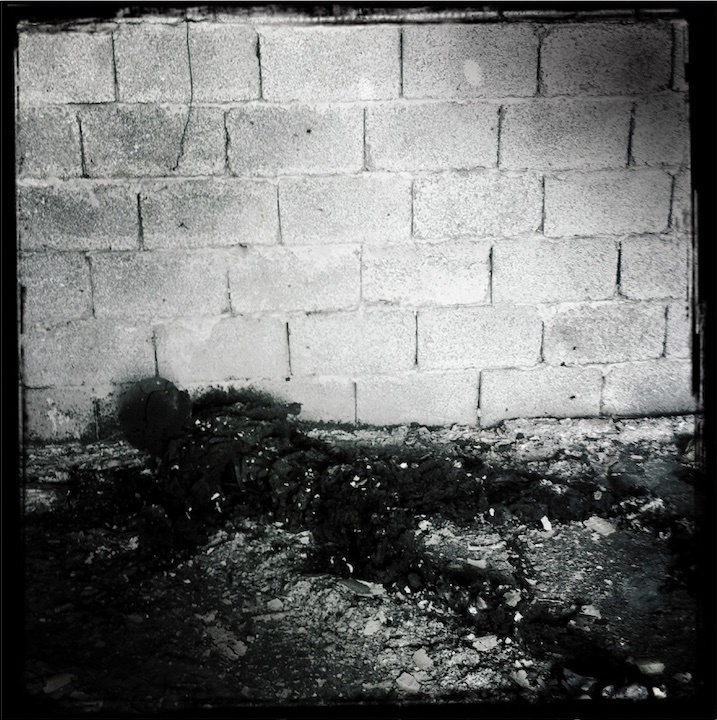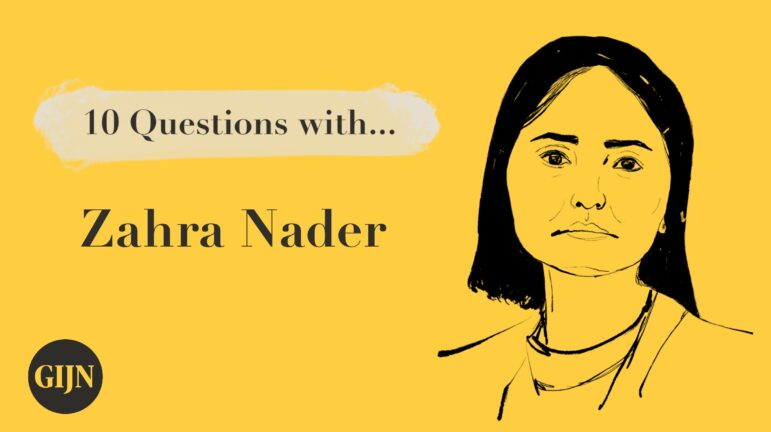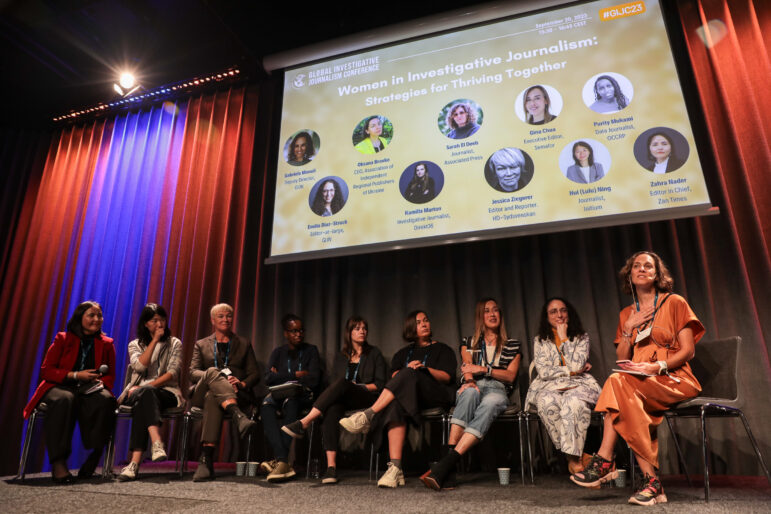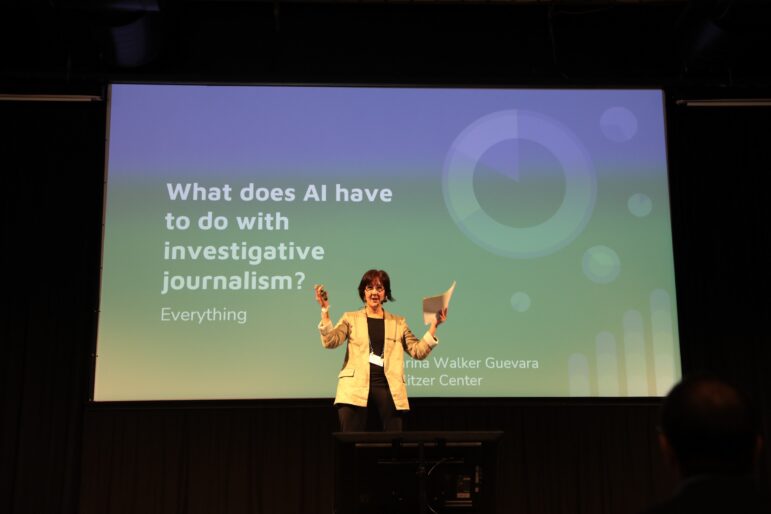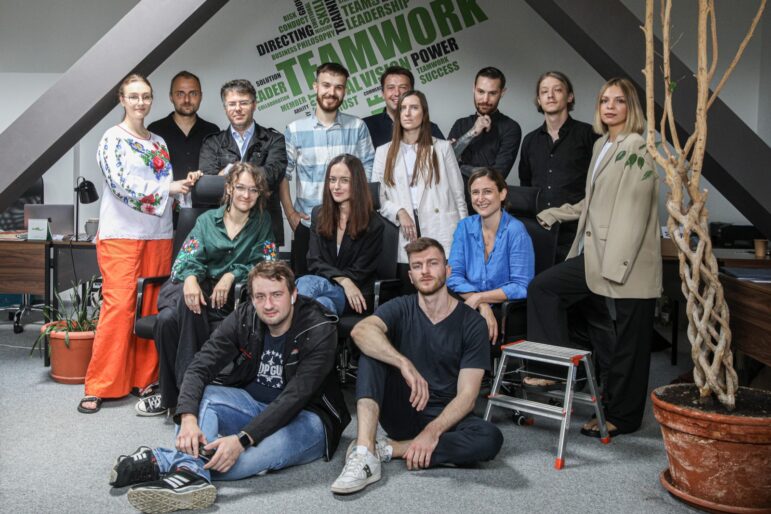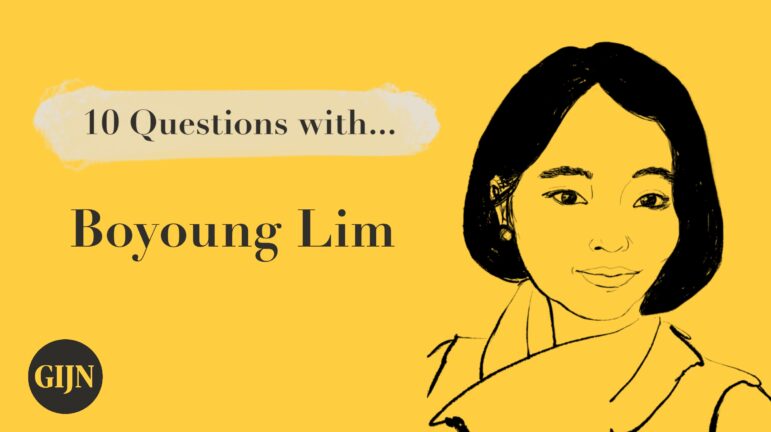

Boyoung Lim is a investigative journalist and the head of the Pulitzer Center's AI Accountability Network. Illustration: Smaranda Tolosano for GIJN
From Korea to the US: A Career Spent Investigating Fraud, Wrongdoing, and Now, AI
Read this article in
Boyoung Lim went from police officer to investigative reporter to head of the Pulitzer Center’s AI Accountability Network. It was a career trajectory that was neither linear nor planned.
Growing up in South Korea, Lim never imagined herself as a journalist. Her dream was to be a police officer.
She graduated from the Korean National Police University and began working on cybercrime. Unlike most other criminal activities, she says, cybercrime requires considerable cross-border collaboration with both overseas law enforcement agencies and the private sector. This gave her training working on investigations as part of a team — one of the skills she built on later as an investigative reporter for the Korea Center for Investigative Journalism – Newstapa (KCIJ-Newstapa), South Korea’s first nonprofit investigative journalism center.
(In fact, Lim originally applied for an administrative post at the outlet, “just to see how a newsroom works,” but was instead offered a position as an investigative reporter when they recognized her skills.)
At Newstapa, Lim worked on cross-border collaborations with networks such as the International Consortium of Investigative Journalists (ICIJ) on stories like the Implant Files, an investigation into the faulty regulation of medical devices. Working with the German public broadcaster NDR, ‘Fake Science’ Factory exposed how Korean academics used phony conferences and publications to bolster their professional profile and go on junkets paid for with taxpayer money.
But it was China Cables, an investigation into the surveillance and mass internment of Uyghurs together with other Muslim minorities in Xinjiang, where Lim first became fascinated with algorithmic surveillance, how governments are using it, and how societies are impacted by it.
Now, Lim heads the Pulitzer Center AI Accountability Network, which offers training and reporting grants to help journalists report on AI but also with AI. According to Lim, she has always loved investigations — as a police officer and as a reporter. In her current post, she finds herself having more impact by supporting journalists to get the funding and expertise they need to hold AI and algorithms accountable.
In this Q&A, part of GIJN’s ongoing interview series with leading investigative journalists, Lim gets candid about overcoming imposter syndrome and burn-out as she transitioned from police officer to investigative journalist.
GIJN: Of all the investigations you’ve worked on, which has been your favorite and why?
Boyoung Lim: The project I had the most fun doing is the ‘Fake Science’ investigation while I was with Newstapa. In collaboration with NDR, who had found several Korean names published in sham journals, we uncovered how academics and students at top universities in Korea (believe it or not, in both North and South Korea) had been using fake conferences and journals as a way to inflate their academic performance while producing low-quality research.
To show our audience how this works, our team submitted an auto-generated paper full of gibberish to one of these conferences. Surprise, surprise, it was accepted. This is their business model: as long as you pay a fee, whatever you submit is accepted without question. They don’t care whether you show up at the conference. Some attendees would not even bother to attend the actual meeting and go sightseeing in cities like Venice, Italy. The problem is most of these Korean academics travel to these conferences on government funding, i.e., taxpayer money. We found a considerable number of academics citing these conferences as achievements in their grant reports to the National Research Foundation of Korea. The story shook Korean academic circles and spurred discussions around research ethics and performance assessments standards.
GIJN: What are the biggest challenges in terms of investigative reporting in the country or region you report on?
BL: The biggest challenges of investigative reporting in South Korea are two-fold: political and economic. From the weaponization of legal action against investigative journalists to the deprioritization of investigative reporting in most newsrooms due to financial constraints.
In September, Newstapa, my former newsroom and the most prominent independent investigative newsroom in South Korea, was raided by the prosecutors’ office amid claims the outlet had defamed the president. Newstapa has also reported on a scandal pre-dating the current president’s time in office, when he was the country’s top prosecutor, as well as a court case involving the First Lady.
On top of that, earlier this year Newstapa and civil rights groups successfully sued the prosecution service to disclose their usage of the special activity expense budget, which previously had never been made public. This legal battle to hold the prosecutor’s office accountable to taxpayers took three years. I can imagine all of this has made those in power very uncomfortable. South Korea is a proven democracy. How the authorities of this country unabashedly decided to weaponize legal actions against journalists — who are trying to hold power to account for the sake of democracy and are just trying to do their job — is deplorable.
On the economic side: from what I hear from other South Korean journalists, the investigative reporting budget is the first to be cut when newsrooms face financial issues. There seems to be a lack of acknowledgement on the positive role investigative and accountability reporting play in a democracy. Fortunately, there is some hope here. More journalists are exploring and experimenting with nonprofit and other alternative financial models to support their work. For example, Newstapa is incubating independent investigative newsrooms through its Newstapa Journalism School by providing training on investigative reporting techniques and how to run a nonprofit newsroom. A local startup investigative newsroom was launched through this project. Newstapa has an ambitious goal to establish 100 independent investigative outlets through this initiative.
GIJN: What’s been the greatest hurdle or challenge that you’ve faced in your time as an investigative journalist?
BL: What I struggled with was the feeling that I was an imposter. I buried myself in work to make up for my lack of education in journalism, to prove to myself that I deserved my space in the newsroom.
Sometimes it got so bad that I was guilting myself on the weekends, pushing myself harder and not letting myself take a good break, thinking that I didn’t deserve one. I failed to appreciate the uniqueness of my career trajectory. Imposter syndrome is the best friend of burnout, from which I suffered severely. In hindsight, I should not have listened to the voice of doubt inside me and should have given myself more credit.
GIJN: What is your best tip or trick for interviewing?
BL: These are some of the things I have always found useful before interviews:
- Read everything there is out there to read about the person or topic.
- Make a list of core questions and less important ones.
- Don’t immediately jump into the core questions when starting the interview. You don’t want to scare them off.
- People love being listened to. Listen sincerely, as if your interviewee is the only person in the world… but verify everything they say.
GIJN: What is a favorite reporting tool, database, or app that you use in your investigations?
BL: It really depends on the type of investigation and what the topic is. My all-time go-to’s are: good old-fashioned pen and paper. Spreadsheets. Post-its. Lining up material in chronological order.
GIJN has lots of useful how-to’s and resources for different types of investigations, as well as tipsheets. If anyone is interested in how to hold AI systems and the people behind them accountable, the Pulitzer Center has some great tips and toolkits for reporting on and with AI.
GIJN: What’s the best advice you have received thus far in your career, and what words of advice would you give an aspiring investigative journalist?
BL: Advice that resonated with me came from books I read and movies I watched to learn more about writing and journalism. From Anne Lamott’s book, “Bird by Bird”: “Perfectionism is the voice of the oppressor, the enemy of the people. It will keep you cramped and insane your whole life, and it is the main obstacle between you and a shitty first draft.”
From the Japanese movie, “The Journalist”: “Believe and doubt yourself more than anyone else.”
GIJN: Who is a journalist you admire, and why?
BL: This is a tough one. There are so many I admire. Most of them you might know, as they are well-known and well-celebrated. But we need to remember that there are also so many journalists out there who we are not aware of, but are risking their lives, have lost their lives, or have been imprisoned for doing their job. They may be less known or less celebrated precisely because they happen to work in a country or region that gets less attention than others.
I recently attended a panel at GIJC23 and was touched by the fearless work of journalists at Zan Times (Afghanistan) whose names we do not know for security reasons. Working as a female journalist under Taliban rule could cost your life, yet they are still working and trying their best to inform their communities and the world. I am humbled by stories I hear about journalists working in such situations with courage and commitment.
Our industry doesn’t celebrate enough those who are not journalists themselves, but whose work makes our work possible. We should remind ourselves to appreciate those who work with us – journalists or not – and people from other walks of life who support our work.

The Pulitzer Center’s AI Accountability Network — headed by Lim — supports journalists reporting on and with AI globally. Image: Screenshot, Pulitzer Center
GIJN: What is the greatest mistake you’ve made and what lessons did you learn?
BL: I’m sure I made mistakes — big and small — on the way. The one that sticks with me to this day, though, is trying to do too much all at once, trying to do everything perfectly, and not giving myself enough credit. At one point, I found myself unable to write anything because I felt overwhelmed and paralyzed. I kept comparing myself to others and discounting the work I had done.
I should have sought feedback from colleagues about my work when I was unsure, instead of locking myself in a vicious cycle. Neglecting my health, both mental and physical, for the sake of work was another stupid mistake I made. Our bodies are not machines – and even machines need maintenance. These days I am making intentional efforts to take good care of myself, get enough sleep, eat well, and exercise. Work is not everything. We need to live our lives outside of work. We need to treat ourselves well to be good human beings before trying to be great journalists.
GIJN: How do you avoid burnout in your line of work?
BL: I did suffer from severe burnout, as I mentioned earlier. Our work can sometimes be very stressful and projects with long timelines can wear you down. I try to break down my work into bite-size pieces. I am practicing to say “no” to avoid biting off more than I can chew.
Other tips; Give yourself rewards for overwork. Give yourself a break. We are of no use to the public if we are burnt to ashes.
GIJN: What about investigative journalism do you find frustrating, or do you hope will change in the future?
BL: Many people have helped make investigative journalism and collaboration more global, more cool. I find hope in the growth of GIJN’s network and the innovative, collaborative networks that are popping up, against all the challenges investigative journalism is facing today.
What we could do more of is to make this space more diverse and inclusive on a global scale. I would love to see and hear more about equal partnerships and collaborations, respectful working culture, and fair crediting.
 Ana P. Santos is a journalist with over 10 years of experience reporting on gender issues related to sexual reproductive health, HIV, and sexual violence. As the Pulitzer Center 2014 Persephone Miel Fellow and grantee, she has reported on labor migration in Europe and the Middle East. Her work has been published by Rappler, DW Germany, The Atlantic, and The Los Angeles Times.
Ana P. Santos is a journalist with over 10 years of experience reporting on gender issues related to sexual reproductive health, HIV, and sexual violence. As the Pulitzer Center 2014 Persephone Miel Fellow and grantee, she has reported on labor migration in Europe and the Middle East. Her work has been published by Rappler, DW Germany, The Atlantic, and The Los Angeles Times.




